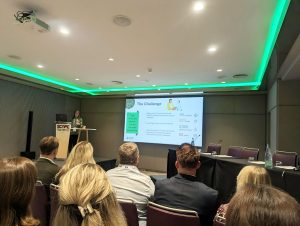Patient centricity in clinical trials has been a guiding theme across clinical research conferences for years, and lately, it’s begun to feel more real. At the recent SCOPE conference in Barcelona, I saw firsthand how sponsors are moving from intention to implementation. They are redesigning protocols based on patient and caregiver input, embedding participant appreciation into trial experiences, and reframing development through patient preference. These shifts are encouraging and signal that meaningful change is possible.
That said, it’s been a long road to get here. Over the past 15 years, as a patient advocate and representative of Imperial, I’ve often felt a quiet frustration while attending conferences. The same well-meaning messages echo from one year to the next, and progress hasn’t always materialized quickly enough:
“Patient engagement needs to be improved.”
↓
“We have a patient-centric approach.”
↓
“We put the patient first.”
↓
“Patient engagement continues to be a challenge in this industry.”
This year felt refreshingly hopeful because the actions are finally starting to catch up to the intention. This left me genuinely encouraged.
From Rhetoric to Reality: Patient-Centered Research Protocols in Action

Annie Gilbert of Boehringer Ingelheim speaks at SCOPE about patient-centricity initiatives.
Between shifts at the Imperial booth during SCOPE, I attended several talks on improving patient centricity in clinical trials that genuinely encouraged me. One standout was Annie Gilbert from Boehringer Ingelheim. She shared details of a large study launched during the COVID wave, a time that made certain changes both necessary and surprisingly feasible.
Boehringer formed an advisory board of patient advocate experts and a separate team of patient and site advisors. These groups reviewed the protocol in advance, discussed every activity, and helped reshape the study design to reflect real-world feedback, including:
- Combining visits to reduce logistical strain
- Addressing participant attendance challenges
- Reducing the burden for both patients and caregivers
Because the program unfolded during the COVID-19 pandemic, all discussions took place remotely. One example of how this remote setup led to meaningful improvements: Boehringer recorded meetings where a trial lead explained the study to a participant online. Watching those recordings together helped refine the messaging and improve participant understanding in real-time.
From this, Boehringer created a Site Engagement Academy to strengthen site-level communication. The goal was to reduce participant burden while improving the experience for everyone involved. They now share participant videos at investigator meetings, document advisory board minutes, and circulate these insights internally to ensure leadership understands the impact of these efforts.
Simple Gestures
Another change that really stood out: it’s now mandatory for all participants in Boehringer studies to receive thank-you cards. It’s a simple gesture that recognizes their time and contribution. Boehringer also provides each participant with a clinical trial experience survey, which allows the study team to continue learning and improving based on real feedback.
This is what groundbreaking participant engagement looks like. It’s one thing to adjust a protocol based on participant and caregiver input—but to check in and make sure the experience stays positive? That was a breath of fresh air.
Bayer’s Early Engagement Model Fosters Patient Centricity in Clinical Trials
Bayer was also making waves at SCOPE. They introduced their “Bridge the Gap” initiative, designed to accelerate decision-making and act quickly on patient input.
Bayer worked closely with advocacy groups and took it a step further by involving patient advocates before the protocol was even drafted. These advocates reviewed early trial concepts and helped shape the study before any documents were submitted for review.
Bayer also invited those same advocates to assist with investigator training, helping sites better understand the broader burden of participation from the patient community. The goal was to reduce strain on both participants and caregivers without adding pressure to the sites.
Too often, easing the load for one group means increasing it for another. Bayer’s approach showed a deeper level of understanding and a real commitment to finding workable solutions for everyone involved.
Panel Perspectives and Participant-Led Design
The panel discussion that followed featured Emma Sutcliffe (ISPEP), Steve Clark and Peter DiBasio (Patient Advocates), Melissa Harris (Fortrea), all of whom kept the momentum going. The theme was clear: when sponsors take insights seriously and implement them effectively, the benefits far outweigh the costs.
Melissa Harris shared a powerful example from a recent epilepsy study. The sponsor asked for CRO support from Fortrea before the protocol was even created. They wanted to know what patients needed, what they could tolerate, and what would make participation feasible. Fortrea interviewed patients and caregivers separately, recognizing that their experiences and perspectives would likely differ. They asked about every planned procedure, test, burden, outcome, and measure of success.
I’ve heard this concept discussed for 15 years, but I’ve rarely seen it put into practice. This was patient-led protocol design in its purest form; an encouraging sign that the field is moving forward.
Reframing Success
Emma Sutcliffe summed it up perfectly: we need to reframe development through patient preference. When we take insights and actually implement them into clinical trial procedures, everyone benefits. Not just through traditional metrics like faster recruitment or better timelines, but through something bigger. Implementing insights is a triple win: the business wins, the patient wins, and society wins.
I left SCOPE genuinely delighted and excited. For the first time in what feels like years, I heard about delivering real change with tangible results in improving patient centricity in clinical trials.
The Imperial Advantage
If you’re exploring ways to bring patient-centric thinking into your clinical trial strategy, we’d love to talk. Imperial has supported sponsors and CROs for decades, helping ease participant burden and making participants feel genuinely valued. We’re here to help you make it happen.

